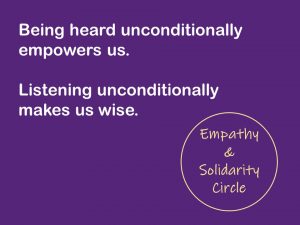In early 2020, I took an initiative which I called Empathy & Solidarity Circle. I wanted to bring people together in a series of very special conversations with the intention of generating empathy and solidarity even during times of immense societal stress and polarization in Hong Kong and around the world. After 16 rounds and 4 months I have taken a pause and I’m excited to report on what is emerging.
What did we do?
By design, I started with a few simple insights based on my experience as a coach and teacher of coaching. First, when people listen to each other, they feel connected, and they feel good. When people willingly comply to a conversation structure that forces them to listen, they will often be surprised, after some initial discomfort, by how easy and enjoyable it is. Likewise, when people enter into a conversation where others, even strangers, are listening to them unconditionally, they will often delight in an experience which is relatively unusual in our daily lives.
And so we tried it. From April through July 2020, I hosted 16 one-hour sessions with up to 19 participants. I guided the participants to slow down and get present to themselves. And then in groups of 2 or 3, they entered into 20-minute structured conversations with the type of intentional listening and self-disclosure that generally occurs in professional coaching conversations.
 What were the results?
What were the results?
Through 16 one-hour sessions, 52 people participated with an average of 9 people at each session. 28 people came more than once and 12 people came more than 5 times. So I think at least some of them liked it!
Many reported that they were surprised at how openly people shared their personal stories and emotions with relative strangers, and how good it felt to be heard unconditionally. Many felt relieved to be able to arrive at the meeting without expectations or responsibilities — that they could just be themselves. People shared emotional ups and downs, the effects of the practical challenges so many were facing through that period. We were amazed that so much emotional release could happen in one short hour, and we dubbed the session a ‘power hour’ for the efficiency of feeling empathy and experiencing solidarity with strangers in such a short period.
Of those who came multiple times, several reported that they felt changed by the experience, that it had been hugely supportive, especially during the difficult and uncertain times at the beginning of the pandemic.
Why did that happen?
Humankind is currently in a particular stage of development where large numbers of adults are forced by the complexity of our lives to broaden our perspectives. As many of us now work in multi-cultural environments, we need to understand and relate to a wider range of people. As gender roles have expanded, we are exposed to a wider variety of approaches to work and life that can enrich us, and expand our choices. As social media tends to magnify more radical and polarizing behaviours and beliefs, finding common interests and alignment with common goals in our organizations and communities is much more complex than it was for generations past. Community solidarity is essential to navigating challenges such as the pandemic and the political changes we are facing. And human beings are therefore striving to find new and better ways to create solidarity.
As described by the STAGES model of human development, many adults are primed to add a 4th person perspective to their meaning-making repertoire. This means that as well as seeing themselves (1st person), others (2nd person) and relationships (3rd person), they can also see contexts, which are groups of relationships. With 4th person perspectives, people are able to interact reciprocally with the mindsets of others —the internal mental, emotional and spiritual belief sets and experiences that are like the secret subtle-level life of others. Adding this level of perspective brings a more complex view of the world, and therefore more choice and more potential. This view is the essence of the development that is required for genuinely coaching others and for effectively leading thought-workers. When we can share and relate to other people’s internal viewpoints, we gain the capacity to engage them and influence them for mutual benefit.
4th personal perspective can be developed through practice, which is exactly what we are doing in the Empathy & Solidarity Circle. With practice the discomfort of listening tends to soften and the rewards of finding connection, empathetic understanding, insight and inspiration from others blossom. Without knowing it, practitioners have gained a new capacity for understanding themselves and the world.
What’s next?
This experience of running this series of group sessions was hugely encouraging to me. My hopes for how people could support each other given a supportive structure, were realized. Even though most participants were complete strangers meeting online for a brief time, they were able to connect and support each other. I learned which specific guides, pointers and instructions could help different kinds of people experience breakthroughs in listening, self-disclosure and connection. I watched as the most regular participants grew new capacities for leading challenging lives.
And so we will do more!
Our next Circle meeting:
Thursday September 3rd, 2020, 12 noon to 1pm
Click here to register.
If you’re new to the Circle, click here to read more about how it works.
I am anticipating hosting more facilitated conversations for different groups such as:
- Young adults (20-35 years old) with an interest in personal development,
- Leaders with an interest in listening for generating engagement and innovation.
- Parents with young children. Please contact Christine Cheong to get involved in this initiative.
If you’re interested to be involved in any of these, inviting your communities or collaborating in creating them, please get in touch with me.
To get a notice for each new Empathy & Solidarity Circle session in the future, please join the mailing list below. We will not use your email for any other purpose and you may unsubscribe at any time.
Thank you for joining me as a co-creator of empathy and solidarity.
